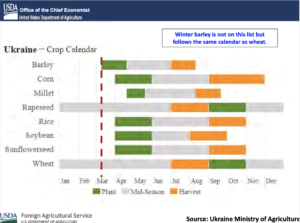President Donald Trump on Friday signed an executive order temporarily expanding the amount of beef the U.S. can import from Argentina, a move the White House says is aimed at…
Ukraine Farmers Plant 30% of Expected Spring Acreage, as Brazil Begins “Fertilizer Diplomacy”
Reuters writer Pavel Polityuk reported yesterday that, “Ukraine’s farmers have sown around 31% of the area expected for the 2022 spring crops sowing, or 4.7 million hectares, Ukrainian grain traders union UGA said on Tuesday, citing official data.
“The union said Ukraine planned to sow 11.45 million hectares of spring grains this year, 3.5 to 4 million hectares less than in 2021 due to the Russian invasion, the ‘occupation of territories’ and mining.
The official data shows that farmers had sown 180,000 hectares of spring wheat, 844,000 hectares of spring barley, 1.274 million hectares of corn and some other commodities.
“It shows the area under spring wheat could total 190,000 hectares, 900,000 hectares of spring barley and 3.9 million hectares of corn.”
The article added that, “Ukraine’s agriculture ministry gave no 2022 grain crop outlook. It has said the sowing area could fall 20% this year due to fighting with Russian troops in many regions.”

In a separate Reuters article yesterday, Pavel Polityuk reported that, “Ukraine is forecast to have a significant shortage of storing facilities in the 2022/23 season due to a sharp fall in exports resulting from Russia’s invasion, analyst APK-Inform said.”
The article explained that, “APK-Inform said on Tuesday that Ukraine’s exports could total only 45.5 million tonnes of 2021’s record harvest of 86 million tonnes and grain and oilseeds stocks at the end of the current season might reach an all-time 21.3 million tonne high.
“‘This volume is 4.2 times higher than in the previous season and will not allow to release a significant share of storing capacities for the new harvest,’ it added.”
And a Reuters article today reported that, “Ukraine’s grain exports fall to around 923,000 tonnes in April from 2.8 million tonnes in the same month in 2021 due to the Russian invasion, analyst APK-Inform said on Wednesday.
“The consultancy said in a report the country’s exports included 768,486 tonnes of corn and 127,130 tonnes of wheat. Ukraine also exported 151,529 tonnes of sunflower oil and 169,681 tonnes of oilseeds, mostly sunseed.”
Meanwhile, Bloomberg writer Mohammed Omar Ahmed reported today that, “Somalia’s inflation is expected to surge past 10% unless the country gets good rains over the next two months to help ease pressure on food prices after losing wheat supplies from Ukraine, according to a top official at its central bank.”
In other developments, Reuters writers Roberto Samora and Ana Mano reported yesterday that, “Brazil’s new agriculture minister Marcos Montes will visit Jordan, Egypt and Morocco in a tour starting this week to discuss increasing fertilizer imports from those countries.
“‘It’s a pilgrimage that we are calling fertilizer diplomacy,’ Montes said in an interview with Reuters late on Monday, adding he would be joined by private sector representatives. ‘We are going to open doors.’
“Brazil relies on imports for about 85% of its fertilizer needs and is concerned about a potential global shortage of the products after Western nations imposed sanctions on key producers Belarus and Russia, while China restricted exports.”
In related news, Reuters writer Tom Polansek reported yesterday that, “Nutrien Ltd, the world’s largest fertilizer company, is assessing whether to further increase potash production as sanctions have disrupted shipments from Russia and Belarus, Chief Executive Ken Seitz said.”
Beyond fertilizer import demands, evolving grain market adjustments are also impacting Brazilian export flows.
Reuters writer Ana Mano reported yesterday that, “Brazilian exports to the 22 countries in the League of Arab Nations rose in the first quarter amid a spike in agricultural commodities prices and a drive to stock up on food, according to a statement sent to Reuters on Tuesday.
“Brazil’s total exports to the group reached $3.86 billion in the period, an almost 34% increase from the same time a year ago, the statement from the Arab-Brazil Chamber of Commerce said.
“A boost in sales to the Arabs nations also reflects Russia’s and Ukraine’s reduced participation in the global grains and fertilizer trade, the statement noted, referring to two major suppliers of products like wheat and sunflower oil.”





